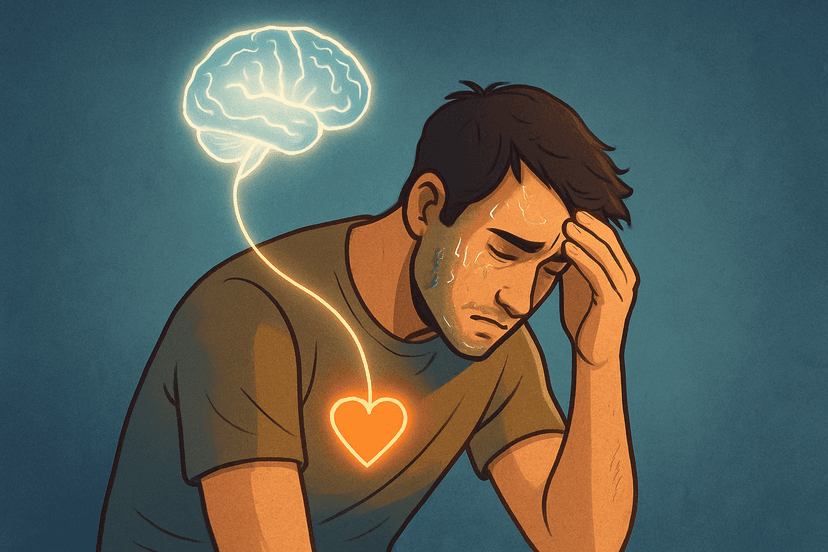
Your brain on porn
Devin McDermott
Let me show you two brain scans.
The first is from a healthy 25-year-old male. The second is from a 25-year-old male who's been using porn regularly for 8 years.
The difference is shocking.
The porn user's brain looks similar to someone with a cocaine addiction. Reduced gray matter. Weakened neural connections. Damaged reward pathways.
This isn't moral judgment. This is neuroscience.
What Porn Does to Your Brain
When you watch porn, your brain releases massive amounts of dopamine - the same neurotransmitter involved in cocaine, gambling, and other addictions.
But here's the problem: your brain wasn't designed for this level of stimulation.
In nature, a man might see a few potential mates in his entire lifetime. Porn gives you access to thousands of "mates" in a single session.
Your brain can't tell the difference between pixels and reality. It thinks you've hit the evolutionary jackpot.
The Dopamine Disaster
Dopamine isn't just about pleasure. It's about motivation, focus, decision-making, and emotional regulation.
When you flood your brain with dopamine regularly, several things happen:
1. Tolerance builds You need more and more stimulation to feel the same effect. This is why guys escalate to more extreme content over time.
2. Receptors downregulate Your brain literally reduces the number of dopamine receptors to protect itself from overstimulation.
3. Baseline drops Normal activities (work, relationships, hobbies) become less rewarding because they can't compete with the artificial high of porn.
The Prefrontal Cortex Damage
The prefrontal cortex is your brain's CEO. It's responsible for:
- Decision making
- Impulse control
- Planning
- Emotional regulation
- Working memory
Regular porn use literally shrinks this region of your brain.
Studies show porn users have:
- Reduced gray matter in the prefrontal cortex
- Weakened connections between brain regions
- Impaired executive function
This is why guys struggling with porn often feel like they can't control their impulses or make good decisions.
The Stress Response System
Porn also hijacks your stress response system.
Each time you use porn, your brain releases stress hormones like cortisol and adrenaline.
Over time, this creates a state of chronic stress, leading to:
- Anxiety
- Depression
- Sleep problems
- Weakened immune system
- Difficulty concentrating
The Real-World Impact
This brain damage isn't just theoretical. It shows up in real life as:
Cognitive problems:
- Brain fog
- Poor memory
- Difficulty concentrating
- Reduced creativity
Emotional problems:
- Depression
- Anxiety
- Mood swings
- Emotional numbness
Social problems:
- Reduced empathy
- Difficulty connecting with others
- Social anxiety
- Relationship problems
Motivational problems:
- Lack of drive
- Procrastination
- Inability to enjoy normal activities
- Loss of ambition
The Addiction Cycle
Here's how the brain changes create a vicious cycle:
- Trigger (stress, boredom, etc.)
- Craving (brain demands dopamine)
- Use (watch porn)
- Temporary relief (dopamine spike)
- Crash (dopamine drops below baseline)
- Increased sensitivity to triggers
- Repeat
Each cycle makes the addiction stronger and the brain damage worse.
The Good News: Neuroplasticity
Here's what gives me hope: the brain can heal.
Neuroplasticity means your brain can form new neural connections and repair damaged ones.
When you stop using porn, several things happen:
Weeks 1-2:
- Withdrawal symptoms as brain adjusts
- Intense cravings as dopamine system recalibrates
Weeks 3-8:
- Dopamine receptors begin to recover
- Prefrontal cortex starts to strengthen
- Stress hormones normalize
Months 3-6:
- Significant improvement in cognitive function
- Better emotional regulation
- Increased motivation and energy
6+ Months:
- Continued healing and strengthening
- Return to baseline brain function
- Sometimes even better than before
The Recovery Timeline
Days 1-14: The Storm Your brain is in panic mode. It's used to regular dopamine hits and doesn't understand why they've stopped.
Expect: Intense cravings, mood swings, brain fog, insomnia.
Days 15-45: The Adjustment Your brain starts to adapt. Dopamine receptors slowly increase. The prefrontal cortex begins to strengthen.
Expect: Gradual improvement in mood and cognition, but still challenging days.
Days 45-90: The Rebuilding Significant neurological healing occurs. You start to feel like yourself again.
Expect: Better focus, improved mood, increased motivation, clearer thinking.
90+ Days: The New Normal Your brain has largely healed. You experience life with a healthy reward system.
Expect: Natural motivation, emotional stability, clear thinking, genuine enjoyment of life.
Factors That Speed Recovery
Exercise: Increases BDNF (brain-derived neurotrophic factor), which helps grow new neurons.
Sleep: Essential for brain repair and memory consolidation.
Nutrition: Omega-3s, antioxidants, and other nutrients support brain health.
Meditation: Strengthens the prefrontal cortex and improves emotional regulation.
Social connection: Releases oxytocin and supports emotional healing.
Learning: Creates new neural pathways and strengthens cognitive function.
The Motivation Factor
Understanding the neuroscience isn't just academic - it's motivational.
When you realize that:
- Your struggles aren't a moral failing
- Your brain has been physically altered
- Recovery is a real, measurable process
- Healing is not only possible but inevitable
It becomes easier to stay committed to the process.
The Bottom Line
Porn addiction isn't a lack of willpower. It's a brain disease.
But unlike some brain diseases, this one is completely reversible.
Every day you stay clean, your brain is healing. New connections are forming. Damaged regions are recovering.
You're literally becoming a different person - neurologically speaking.
The man with a healthy brain. Clear thinking. Natural motivation. Emotional stability.
That's not just a nice idea. It's a neurological reality waiting for you on the other side of recovery.
Your brain wants to heal. You just have to give it the chance.
Quit Porn For Good
Get exclusive tips, resources, and inspiration to help you overcome addiction and live a healthier life. Subscribe to our newsletter below.
We're committed to your privacy. You may unsubscribe at any time. Privacy Policy